Homeopathic medicines are everywhere. There are remedies for colds, fevers, depression, insect bites, headaches, warts, menstrual cramps, food poisoning, hangovers… basically whatever ails you. (Or your children or pets.)
Homeopathic remedies are marketed as safe and natural alternatives to drugs, and proponents claim they promote the body’s innate ability to heal itself. They are widely sold in drugstores, typically next to medicines, and in packaging that makes them indistinguishable from medicines.


But what is homeopathy? And does it work?
[Learn more: Alternative medicine: The allure and harm of Big Placebo]
History of homeopathy
I wouldn’t have wanted to be sick in the 18th century. This was before the discovery of germs and antibiotics, before the use of anesthesia for surgery, and before the testing of drugs for safety and efficacy.
At the time, doctors understood very little about the causes and treatments of diseases. For example, most doctors thought illnesses were caused by an imbalance of humors, or bodily fluids, so common treatments were bleeding and purging. And mercury was thought to cure about everything.
German physician Samuel Hahnemann rejected much of the medical practices at the time. In 1796, after learning that cinchona bark could cure malaria, he ingested the bark to see what effects it had. (Interestingly, cinchona bark contains quinine, which is still used today to treat malaria.) Hahnemann developed fever, joint pain, and chills….. all of which are also symptoms of malaria.
From this self experiment, Hahnemann discovered the first “law” of homeopathy, which is that “like cures like.” In other words, substances that cause specific symptoms in healthy people can be used to cure diseases that cause the same symptoms.
As Hahnemann searched for remedies, he “tested” various substances on healthy individuals with “provings,” documenting every possible symptom for days… every sneeze, itch, dream…. The assumption was that the substance caused all of the reported sensations, and therefore could be used to treat patients with those symptoms.
Because large doses of the substances could be harmful, Hahnemann diluted the remedies. I mean really diluted them, until there was basically none of the substance left. This discovery led to the second “law” of homeopathy, the law of infinitesimals, which states that diluting substances makes them more effective. The more it’s diluted, the stronger it becomes.
Later, Hahnemann observed that his remedies worked better on house calls, so he concluded it was due to the shaking of the remedy in his saddle bag. Therefore he specified that remedies should be vigorously shaken between each dilution in a process called “succussion.”
The process works like this:
- Take one part of the substance and mix it in nine parts of water or alcohol. This 10% solution is a dilution of 1X. Shake.
- Repeat by taking one part of that solution and dissolving it in nine parts of water or alcohol. This 1% solution is a dilution of 2X or 1C…. and is STRONGER than the previous dilution. Shake.
- Repeat, repeat, repeat…..
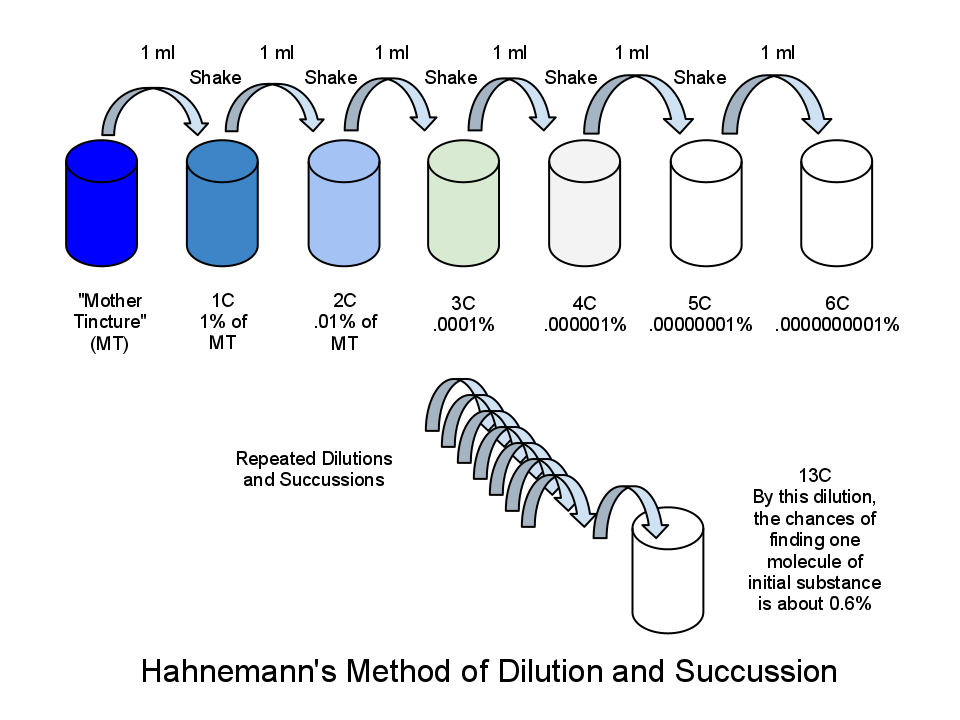

Just how diluted are homeopathic remedies?
- A 12C solution is like putting a pinch of salt in both the North and South Atlantic Oceans.
- For a 30C solution to contain a single molecule of the original substance, the container would need to be 30 million times the size of Earth.
- As there are only about 1080 atoms in the entire universe, a 40C dilution represents approximately one molecule in the universe.
- A 200C dilution, such as the popular homeopathic flu remedy Oscillococcinum, would therefore require 10320 more atoms than exists in the universe to contain one molecule.
And there are even dilutions with the Roman numeral M, which is 1,000C.


If you’re scratching your head because this seems to violate every known law of chemistry and physics, it gets even better. To explain how a remedy supposedly gets stronger the more it’s diluted, homeopaths offer the following: The vibrations from the succussions cause the water to remember the medicine, even when it’s long gone.
So there’s literally nothing in homeopathic remedies. But at least Hahnemann’s treatments were less dangerous than the medicine commonly available in the 18th century.
Does homeopathy work?
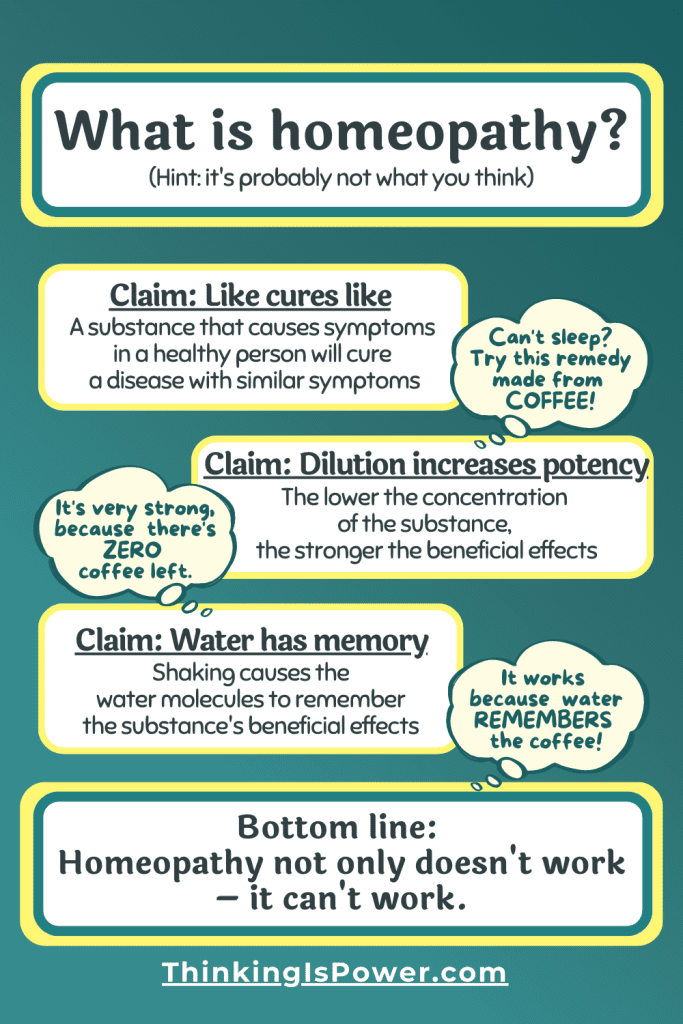

Let’s start with the obvious: Homeopathic claims make no sense. Let’s briefly consider each of two “laws.”
The “law” of similars (aka like cures like): Homeopaths claim that substances used in remedies treat the symptoms they cause. So imagine you have the following symptoms. What might a homeopath prescribe?
- Insomnia is cured by Coffea Cruda, or caffeine.
- Hay fever with watery nose and runny eyes is cured by Allium Cepa, or onions.
- Oppression and feelings of isolation and despair is treated with Murus Berlinensis, or the Berlin Wall.
- Feelings of being restricted or separated from people can be cured with Latex Vulcani, or condoms.
- Self-disgust, suppression of anger, and low self-esteem with dependency is treated with Excrementum Caninum, or dog poo.
This “law” of homeopathy is at odds with modern science. Today we know that symptoms are the body’s response to a disease, and that diseases can be caused by infectious agents or a combination of genetic and environmental factors. Therefore, doctors diagnose and treat the underlying disease that’s causing a patient’s symptoms.
Homeopaths try to defend their remedies by comparing them to how vaccines work. However this analogy doesn’t stand up to scrutiny. Instead of exposing the body to something that supposedly causes the same symptoms, vaccines build up the body’s immunity to a specific germ that causes a disease. In addition, vaccines contain measurable amounts of known ingredients, such as pieces of viruses or bacteria or their proteins, and trigger an immune response with a known mechanism.
The “law” of infinitesimals: Asserting that diluting substances makes them more potent ignores the most basic premise of medicine and toxicology: Doses matter.
Think of it this way: If you were forced, would you choose to drink a solution containing 1% (1X) or 0.000001% (4C) poison hemlock? I know which I’d choose, although homeopaths would claim the latter is more potent.
There’s also no plausible mechanism for water to “remember” what was dissolved in it. And if it did, wouldn’t it remember everything? Maybe that trip through a sewage treatment plant?
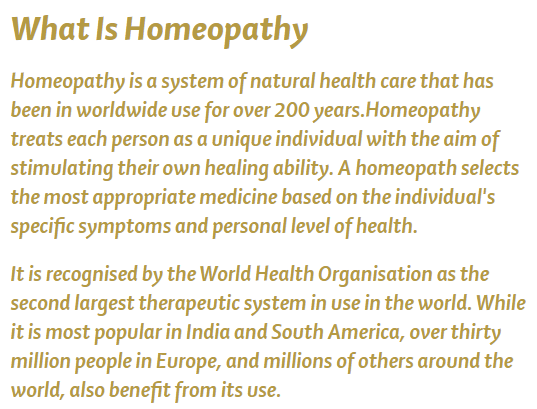

Homeopathy also relies on many lines of fallacious reasoning, as seen in description of homeopathy from The School of Homeopathy in the UK.
- Appeal to nature: Is homeopathy safer or more effective because it’s natural? Some remedies “contain” arsenic or cobra venom….both of which are natural. This fallacy is incredibly common, and advertisers love to use “natural” labels to convince us to buy their products. But we simply cannot know whether something is good or bad based on whether it’s natural or not.
- Appeal to tradition: Is homeopathy safer or more effective because it was developed over 200 years ago? In the 19th century cocaine and heroin were common medicines, but science has helped us weed out bad ideas, and build on ones that work. If something truly works, provide the evidence….. And historical reasons are not evidence.
- Bandwagon: Is homeopathy safer or more effective because millions of people use it? Popularity doesn’t make something true. A lot of people can be, and have been, wrong.
To know if a remedy actually works, it needs to be tested. Medicine has come a long way since Hahnemann discovered homeopathy. We now know that anecdotes like “provings” are unreliable, because people can easily misperceive their experiences. We know that correlation doesn’t prove causation. If I have vivid dreams after taking a pill we can’t know for sure that the pill caused the dreams. We also know that placebos, which have no therapeutic value, can cause people’s symptoms to improve due to the placebo effect.
Due to these reasons, modern drugs are tested using controlled studies, where some subjects are given the treatment and others a placebo. The best kinds of studies are double-blinded, meaning neither the patients nor the doctors know which kinds of treatment they’re receiving. Only if the medication performs better than the placebo can we say the drug is effective.
So what has science found when it’s tested homeopathy? It doesn’t work. It’s a placebo. A recent systematic review of over 1,800 studies concluded that there is “no good quality evidence to support the claim that homeopathy is effective in treating health conditions.” Even the National Center for Complementary and Integrative Health, the federal agency attempting to prove the effectiveness of alternative treatments, says, “There’s little evidence to support homeopathy as an effective treatment for any specific health condition.”
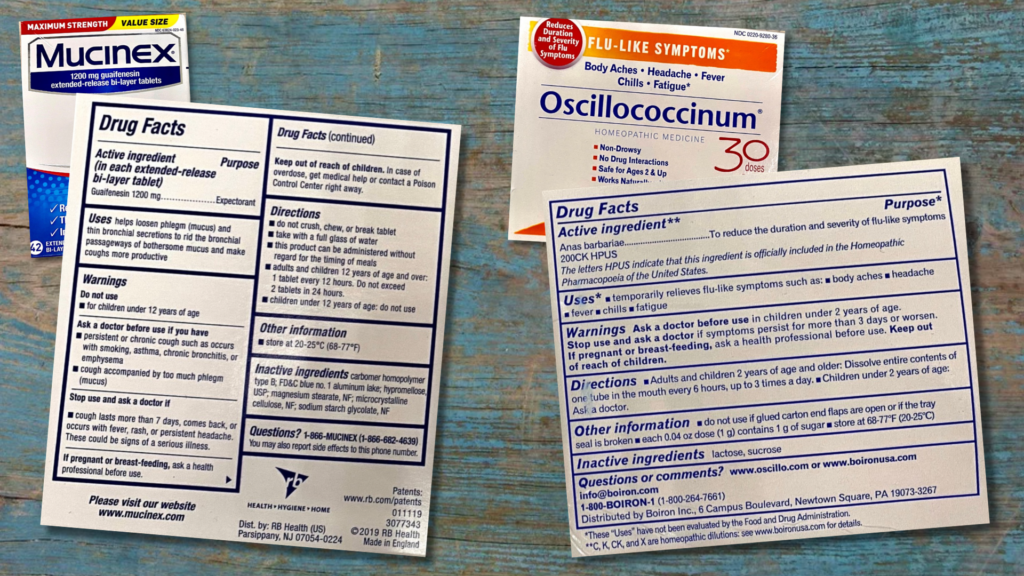

But homeopathy “worked for me.” Besides, “what’s the harm?”
To many, “it worked for me” is all the evidence they need. And I get it, but hear me out.
We often trust that our personal experiences are reliable, but we really shouldn’t. No one can fool us like we can: we’re biased and irrational and see what we expect and want to see. If homeopathy “worked for you,” you most likely experienced the placebo effect.
Another reason for homeopathy’s apparent effectiveness is something called regression to the mean, which is a fancy way of saying unusual events tend to be followed by average ones. Many of the things that ail us, like headaches, colds, warts, etc, improve on their own, including chronic conditions whose symptoms ebb and flow over time. So maybe it wasn’t the remedy, but just a return to your normal state of health. (It’s not a coincidence that the FDA allows homeopathic products to be sold as long as they’re for “self-limiting” conditions that aren’t serious. In short, their position is that you’re going to get over it anyway, so there’s no harm in using homeopathy.)
But what harm can it cause?
- It’s not cheap: Personally, I’m too cheap to spend my money on things that don’t work. Americans spend billions of dollars a year on homeopathy. Oscillococcinum, the popular flu remedy, is $30. And there’s literally nothing in it.
- Delaying effective medical treatment: Placebos are relatively effective at treating pain and other perceived symptoms of illnesses or diseases, but they do not treat the underlying condition. If homeopathy is being used to replace or delay evidence-based medical treatment, the condition can worsen. For example, cancer patients that use alternative medicine, such as homeopathy, are five times more likely to die.
- They aren’t regulated: The FDA requires medicines be tested to demonstrate that they’re effective, safe, and contain what they claim to contain. However, no homeopathic products have been approved by the FDA. Previous tests by the FDA have found instances of incorrect dilutions resulting in measurable amounts of the active ingredients, while others have been found to be contaminated with harmful bacteria. In one example, over 370 infants became ill and eight died after taking homeopathic teething products containing high levels of belladonna, or deadly nightshade.
- Perpetuates the distrust of modern medicine: Many people who use homeopathy are looking for “natural” and “safe” alternatives to drugs. Others may have health problems that are difficult to treat and are looking for hope. In the U.S., healthcare is big business, and there’s a sense that “Big Pharma” is greedy and corrupt. But when you buy an FDA-approved medicine, the company behind the product has had to prove that it’s effective and safe, and that what’s on the label is what’s in the bottle. Companies that sell homeopathic products have had to do none of that. “Big Placebo” is after your money, too, without those pesky details standing in their way.
The take-home message
Medicine has come a long way since Samuel Hahnemann discovered homeopathy in the late 18th century. At the time, being treated by a placebo was almost certainly preferable to much of what medicine had to offer. But in the centuries since, science-based medicine has progressed and increased our quality and quantity of life.
In contrast, homeopathy hasn’t progressed; its foundations remain the “laws” Hahnemann proposed over two centuries ago. In light of modern science, homeopathy’s claims don’t make sense. Plus they’ve been conclusively disproved. The bottom line is that homeopathy is very effective (and expensive) pseudoscience.
There may be many reasons why people today use homeopathy. But homeopathy’s greatest weapon is probably that no one knows what it is.
To learn more
Science-Based Medicine: Homeopathy
Quackwatch: Homeopathy: The Ultimate Fake
TED: James Randi: Homeopathy, quackery and fraud
Skeptical Inquirer: An Intro to Homeopathy
FDA: Homeopathic Products
Wien Klin Wochenschr: Against all odds—the persistent popularity of homeopathy
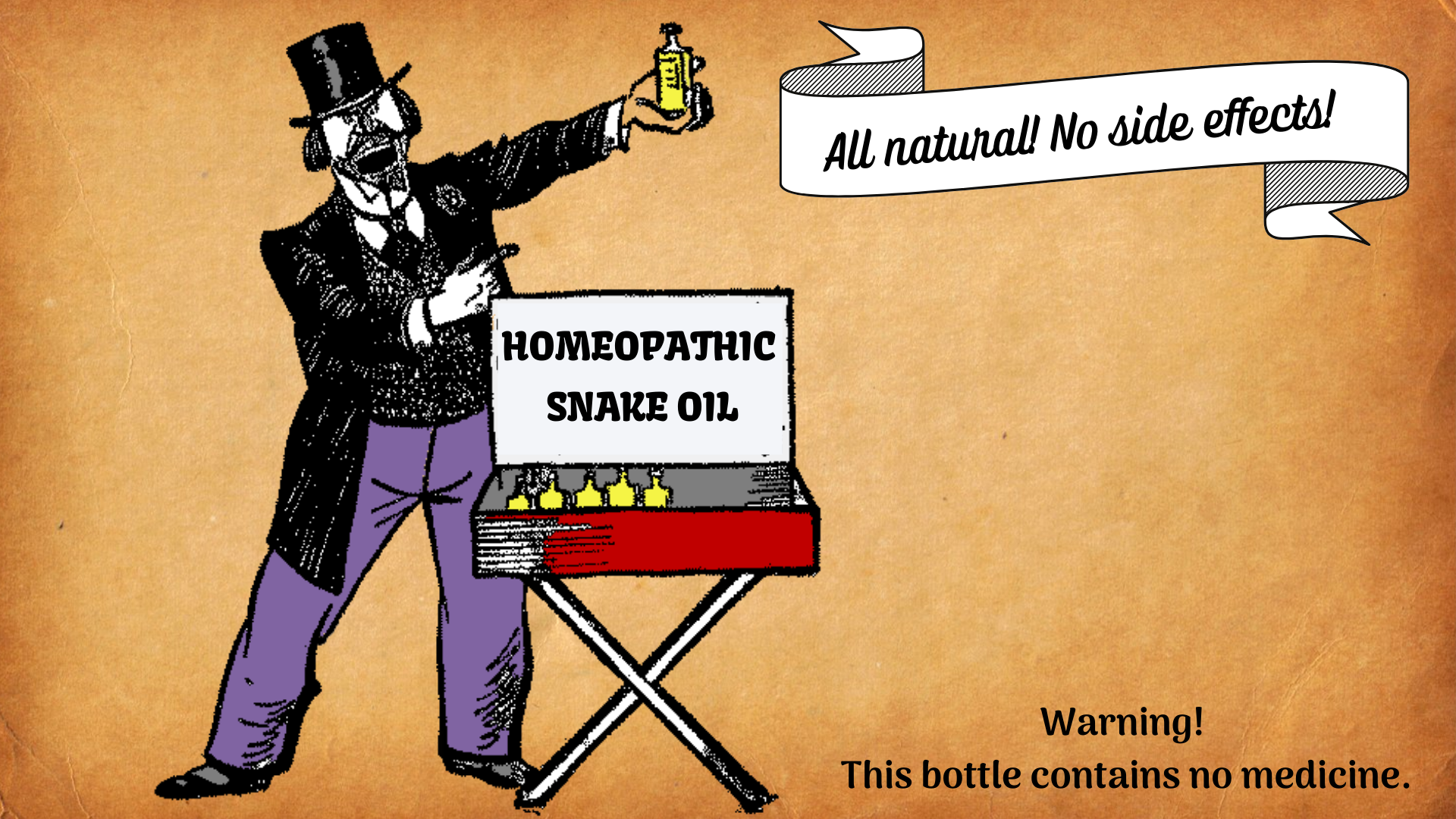
I’m not that much of a internet reader to be honest but your blogs really nice, keep it up! I’ll go ahead and bookmark your website to come back down the road. We are also offering similar Services.
You didn’t make it clear that the silly examples of homoeopathic nonsense such as use of the Berlin Wall & canine excrement are real examples offered to the gullible by homeopaths. In the case of Berlin Wall a piece of concrete, but not any piece of concrete – a genuine piece of 1960s East German concrete. Concrete, being insoluble, by the way can’t be diluted but that doesn’t stop it genuinely being offered as a homeopathic remedy.
I’m not sure how much clearer I could be. I link to each of the “remedies.”
Pingback: Arnica: A *Real* Sugar Pill. But It Won’t Make Your Car Go Further – Simply Commodities